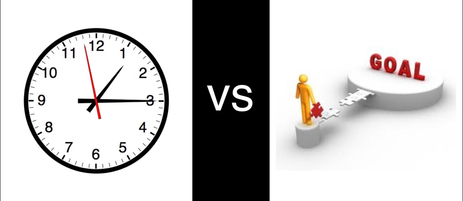|
I am a bit of a self-help junkie. Lord knows I need it. My first architect-boss informed me that I might make a better monk than an architect. I never listen. During my self-help bingeing years, I probably consumed two dozen books that tried to tell me how to manage time. Very little of that wisdom stuck. The real help came from the authors who talked more about goals and priorities than time-management. Folks like Steven Covey, and Dan Sullivan of The Strategic Coach. But once you set goals for yourself, how do you actually get there? The best system I have found is 'The Three Things'. I don't know where it originates, but at least once a year I read an article that promotes the idea. Before I explain how I use The Three Things idea, let's lay some groundwork. The first issue is that time-management too often focuses on efficiency - getting the most done every day. It's exhausting. Goal-management on the other hand is all about effectiveness. If you are being effective, efficiency doesn't matter very much. By focusing on your goals you will automatically eliminate time-wasters. For instance email is 90%+ a waste of time for most of us. 'Don't start your day with email; you may not recover.' I see that advice about once a month. A recent tweak in this concept is to never read email that you are copied on. Move it to a folder, automatically if you can. The point being that the sender and receiver are handling the issue. You don't need to be involved. How you handle email "trains" your correspondents to act in a certain way toward you. If you answer email all day long you are training people to have running conversations with you during which the issue slowly unfolds (and the number of emails multiplies). If you answer email once a day, people will present the whole case to you in hopes of getting an answer today. The second issue is that everything you need to do is not goal-related. To be effective though you need to save those tasks for after you have achieved your goals for the day. Take care of your goal-oriented tasks first before you get derailed. The third issue is "setup time". Before you tackle some tasks, you need to get set up for them. Often this is unconscious or psychological. You intend to get started, but you keep finding things that have to be cleared up so you can concentrate. If you are prone to that syndrome, and I certainly am, plan for it. Start early so that 'clearing up' stuff doesn't put you into crisis mode later on. Setup time is a real thing, so it is better to acknowledge it. The final issue is "bunk off days". You have heard of biorhythms, right? There are going to be days when despite deadlines, planning, and best intentions nothing useful is going to happen. I'm not talking about distractions. I'm talking about being useless. It is like writer's block. You can sit there, but it ain't happening. My advice is 'bunk off'. Go somewhere and find a way to entertain yourself. Re-live season 4, episode 5 (The Bad Boys) of The IT Crowd. Feeling useless all day is not fun, bunking off is. OK. Here is how The Three Things works. You start by selecting three goals for the year. You might replace a goal as the year unfolds. That's legitimate. But 3 is the number, no fewer, no more. Next, with those three goals in mind, select three goals for this month. You might focus on just one of the goals for the year, or all three. Whatever makes sense to you. Similarly you select three goals for the week and for tomorrow. Make each task easily attainable in the timeframe you are working with - day, week, month, year. The concept is to 'feel' the progress toward the goals you have set. In my experience, getting stuck on a goal leads to abandoning the goal. That's not the point, so easy goals is the watchword. However, abandoning goals is completely acceptable. Changing your mind about what is important is OK. Modify whenever you think you are headed in the wrong direction. But daily progress is really important to sticking to your goal-achieving. You will probably think of other things to add to your goals from time to time that don't fit The Three Things system. Pick a place to file them for later. Browse them occasionally, say, a couple times a year if you want. I put mine in Evernote with the tag:to-do. It feels good to know I captured the idea, and it is easy to retrieve all of them for review. The Three Things' finite list of 12 goals makes success easy, almost assured. You don't waste time managing a two page to-do list (single spaced - been there). But you do SPEND time on what is important to you, instead of just PLANNING to spend time on what is important to you. I have used Post-It Notes, a folded piece of paper, Moleskine notebook, Word, Nozbe, Evernote, and currently Backpack. The 'how' doesn't really matter. Using the tool to accomplish what is important to you is the whole, and only, point. ### These are links to two other articles on TIME. Random Thoughts On Time-Management Setting Priorities Comments are closed.
|
x
Archives
February 2024
Categories
All
|
Architekwiki | Architect's Resource | Greater Cincinnati
© 2012-2022 Architekwiki
© 2012-2022 Architekwiki








